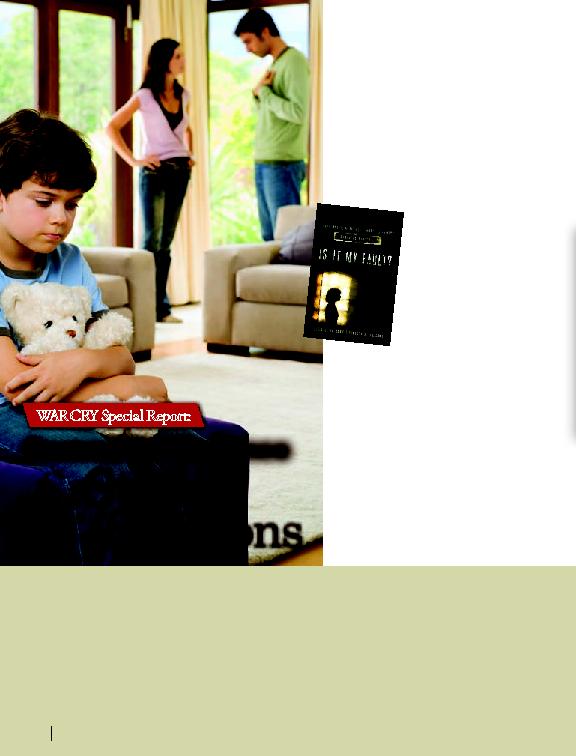
R
16
The War Cry | SEPTEMBER 2014
The Blame Game
J
ustin and Lindsey Holcomb are the
authors of the recently released Is It My
Fault?
Hope and Healing for Those Suffer-
ing Domestic Violence
. Justin is an Episcopal
priest and director at Key Life Network. He
also teaches theology at Gordon-Conwell
Theological Seminary and Reformed Theo-
logical Seminary. Lindsey counsels victims
of sexual assault and domestic violence.
"We titled our book Is It My
Fault? because that is one of
the dominant questions that
those who suffer domestic
abuse are asking. They feel
blame because the surrounding
culture blames victims. Perpetra-
tors and abusers blame victims.
Most victims think they're to blame
in general. The perpetrators shift
blame. The perpetrators are mas-
ters at blame shifting. We wanted
to say, `No. You're not to blame. There is nothing
you can have done, are doing, or could do, have
said, are saying, or will say, that would ever make
you deserving of abuse.'
"They are victims of someone's sin. There's no
sin they could have committed that would make
them deserving of being abused and humiliated
and harmed and threatened and exploited.
"Many people ask blaming questions like, `Why
don't you leave?' `It must not be that bad' `What
did you do to make him that angry?' `He seems
like a good guy.' Usually most of the questions are
actually victim�blaming questions and not actu-
ally believing the women who's going through
some trauma. The long�term abuse they endure
usually results in post�traumatic stress disorder."
Excerpted from an interview in The Christian Post, 7/15/2014.
Used by permission.
Identifying Abusive Behavior
W
hen a person considers that some of his
or her actions and attitudes toward a
partner may be abusive, it is an important first
step toward change and toward a mutually ben-
eficial relationship. It may be difficult to admit,
but since one of the main problems with repeat
abusers is their denial of their abusive acts and
attitudes, taking this first step means a person
recognizes that he or she is the only one who
can take responsibility and make a difference.
The following questions help determine if actions are abusive:
1. Would you treat your boss, friend or next�door�neighbor the
same way you do your partner?
2. If someone were treating your daughter, son, brother, sister or
friend the same way you treat your partner, would you consider
it okay or not?
3. Has your partner told you that your behavior is unreasonable or
abusive?
4. Has your partner either left you or threatened to leave you if
you don't stop being nasty?
5. Have previous relationships been disrupted due to your behavior?*
WAR CRY Special Report:
Domestic
Violence
Stats &
Solutions
* An answer of "No" to 1 or 2 and "Yes" to any of 3-5 indicates abusive tendencies.
